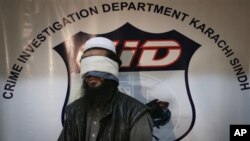ISLAMABAD —
Pakistan has decided to release a former top Taliban leader in an effort to resolve the conflict in neighboring Afghanistan. The move comes as national leaders in Pakistan agree the government should sit down with Pakistani militants to restore security to the country.
Pakistan Foreign Ministry spokesman Aizaz Ahmad Chaudhry on Tuesday announced that Islamabad has decided to release former Afghan Taliban deputy leader Mullah Abdul Ghani Baradar.
The release of Baradar, which spokesman Chaudhry said would take place at an “appropriate time,” is seen as a move to revive stalled talks between the militant group and Afghan representatives to take place in Qatar.
The United States and others stakeholders are pushing hard to bring an end to the prolonged Taliban insurgency in neighboring Afghanistan before international combat forces leave the country by the end of 2014.
Baradar was once the Afghan Taliban’s second-in-command. But Pakistan’s former ambassador to Afghanistan, Rustam Shah Mohmand, cautioned that Baradar lost credibility with the militant group after he was arrested by Pakistani authorities in 2010.
"It may have a symbolic importance, his release at this point in time, but it will have no bearing on the course of negotiation -- reconciliation talks either between the Pakistan government and the tribal leaders, militants in Pakistan or with the suspended Doha talks in Qatar," he said.
More than 30 Taliban members have been released in Pakistan since last year, in the hope that they will help persuade Afghan militants to end violence and become part of a political reconciliation process in Afghanistan.
On Monday, political and military leaders in Pakistan, who also face the threat of extremist and terrorist attacks, voiced support for the efforts of Pakistani Prime Minister Nawaz Sharif's government to start talks with “all stakeholders” to end extremist violence in Pakistan.
Pakistan’s civilian, military and intelligence leaders said in a group statement they had reached a consensus for talks. But former interior minister Tasneem Noorani said it was unclear how that process would unfold and the degree to which the government would be able to make concessions to extremists like the Pakistan Taliban.
“There is certainly nothing given out by the government so far to say that this is the main ingredients of our security strategy," he said.
Ashraf Ali, president of the FATA Research Center, which focuses on issues in northwest Pakistan's Federally Administered Tribal Areas -- a region that includes numerous militant strongholds -- said just having everyone on the same page was a step forward.
"This is something good that we saw, the political and military leadership on the same page for the first time, and you could see them (at) one table, so that's a very good move for the first time that we see," said Ali.
Previous agreements between Islamabad and the Taliban have not held, and have failed to end the conflict. Some analysts said that defusing the war with the Taliban in Afghanistan could help weaken Taliban militants in Pakistan.
Pakistan Foreign Ministry spokesman Aizaz Ahmad Chaudhry on Tuesday announced that Islamabad has decided to release former Afghan Taliban deputy leader Mullah Abdul Ghani Baradar.
The release of Baradar, which spokesman Chaudhry said would take place at an “appropriate time,” is seen as a move to revive stalled talks between the militant group and Afghan representatives to take place in Qatar.
The United States and others stakeholders are pushing hard to bring an end to the prolonged Taliban insurgency in neighboring Afghanistan before international combat forces leave the country by the end of 2014.
Baradar was once the Afghan Taliban’s second-in-command. But Pakistan’s former ambassador to Afghanistan, Rustam Shah Mohmand, cautioned that Baradar lost credibility with the militant group after he was arrested by Pakistani authorities in 2010.
"It may have a symbolic importance, his release at this point in time, but it will have no bearing on the course of negotiation -- reconciliation talks either between the Pakistan government and the tribal leaders, militants in Pakistan or with the suspended Doha talks in Qatar," he said.
More than 30 Taliban members have been released in Pakistan since last year, in the hope that they will help persuade Afghan militants to end violence and become part of a political reconciliation process in Afghanistan.
On Monday, political and military leaders in Pakistan, who also face the threat of extremist and terrorist attacks, voiced support for the efforts of Pakistani Prime Minister Nawaz Sharif's government to start talks with “all stakeholders” to end extremist violence in Pakistan.
Pakistan’s civilian, military and intelligence leaders said in a group statement they had reached a consensus for talks. But former interior minister Tasneem Noorani said it was unclear how that process would unfold and the degree to which the government would be able to make concessions to extremists like the Pakistan Taliban.
“There is certainly nothing given out by the government so far to say that this is the main ingredients of our security strategy," he said.
Ashraf Ali, president of the FATA Research Center, which focuses on issues in northwest Pakistan's Federally Administered Tribal Areas -- a region that includes numerous militant strongholds -- said just having everyone on the same page was a step forward.
"This is something good that we saw, the political and military leadership on the same page for the first time, and you could see them (at) one table, so that's a very good move for the first time that we see," said Ali.
Previous agreements between Islamabad and the Taliban have not held, and have failed to end the conflict. Some analysts said that defusing the war with the Taliban in Afghanistan could help weaken Taliban militants in Pakistan.





